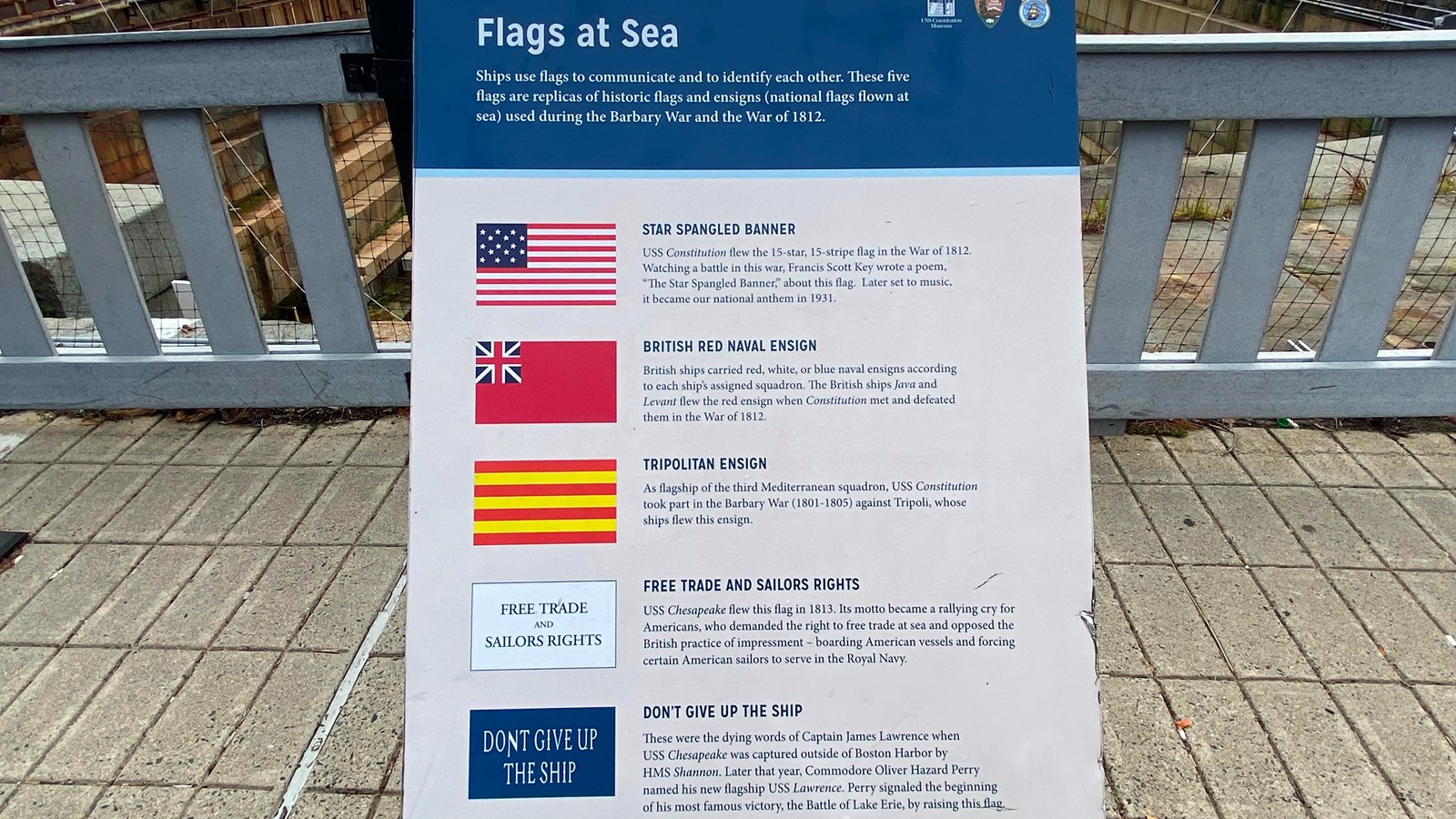Last updated: January 22, 2024
Place
"Flags at Sea" Sign

NPS Photo/MWoods
Description:
Low-profile wayside that is 28.5 x 38 inches. The sign is attached to the flagpole and suspended in the air. The sign is located on cement in front of a flagpole facing Dry Dock 1.
Layout
At the top of the sign is a blue banner with white text. The text includes the title, "Flags at Sea," aligned to the left. Before the title is a paragraph. Aligned in the top right corner of the banner are three small logos in a row. The first is the USS Constitution Museum logo with "USS Constitution Museum" written below. The second is the National Park Service arrowhead. The third is the USS Constitution logo. A light blue line separates the top banner from the rest of the panel. The rest of the panel has an off-white background with navy blue text. Text and images are arranged in two columns and five rows. The first column features images of various flags. The second column features text. Each row has the corresponding flag title in all caps and bolded. A paragraph describing the flag is below each title.
Title
Flags at Sea
Main Text
Ships use flags to communicate and to identify each other. These five flags are replicas of historic flags and ensigns (national flags flown at sea) used during the Barbary War and the War of 1812.
Image (first row)
The American flag in 1812. A blue square in the top left corner features 15 white stars divided into three stars per row. The rest of the flag is divided into 15 alternating red and white stripes.
Image Title
Star Spangled Banner
Image Text
USS Constitution flew the 15-star, 15-stripe flag in the War of 1812. Watching a battle in this war, Francis Scott Key wrote a poem, “The Star Spangled Banner,” about this flag. Later set to music, it became our national anthem in 1931.
Image (second row)
British ensign circa 1812. A solid red flag with the current flag of Great Britain in the top left corner. This flag is a square and is made up of four white stripes horizontal, diagonal, and vertical on a blue field, with a red cross in the middle.
Image Title
British Red Naval Ensign
Image Text
British ships carried red, white, or blue naval ensigns according to each ship's assigned squadron. The British ships Java and Levant flew the red ensign when Constitution met and defeated them in the War of 1812.
Image (third row)
Tripolitan flag circa the early 1800s. The flag is made up of seven horizontal stripes alternating between red and yellow. It begins and ends with red stripes.
Image Title
Tripolitan Ensign
Image Text
As flagship of the third Mediterranean squadron, USS Constitution took part in the Barbary War (1801 - 1805) against Tripoli, whose ships flew this ensign.
Image (fourth row)
Sailors Rights flag. The flag has a white background and three rows of centered text in capitalized letters and blue font. The first row reads "Free Trade." The second row reads "And" in smaller font. The third row reads "Sailors Rights."
Image Title
Free Trade and Sailors Rights
Image Text
USS Chesapeake flew this flag in 1813. Its motto became a rallying cry for the Americans, who demanded the right to free trade at sea and opposed the British practice of impressment – boarding American vessels and forcing certain American sailors to serve in the Royal Navy.
Image (fifth row)
Battle flag. The flag has a navy blue background with two rows of centered white text in capitalized letters. The first row reads "Don't Give Up," and the second reads "The Ship."
Image Title
Don't Give Up the Ship
Image Text
These were the dying words of Captain James Lawrence when USS Chesapeake was captured outside of Boston Harbor by HMS Shannon. Later that year, Commodore Oliver Hazard Perry named his new flagship USS Lawrence. Perry signaled the beginning of his most famous victory, the Battle of Lake Erie, by raising this flag.
